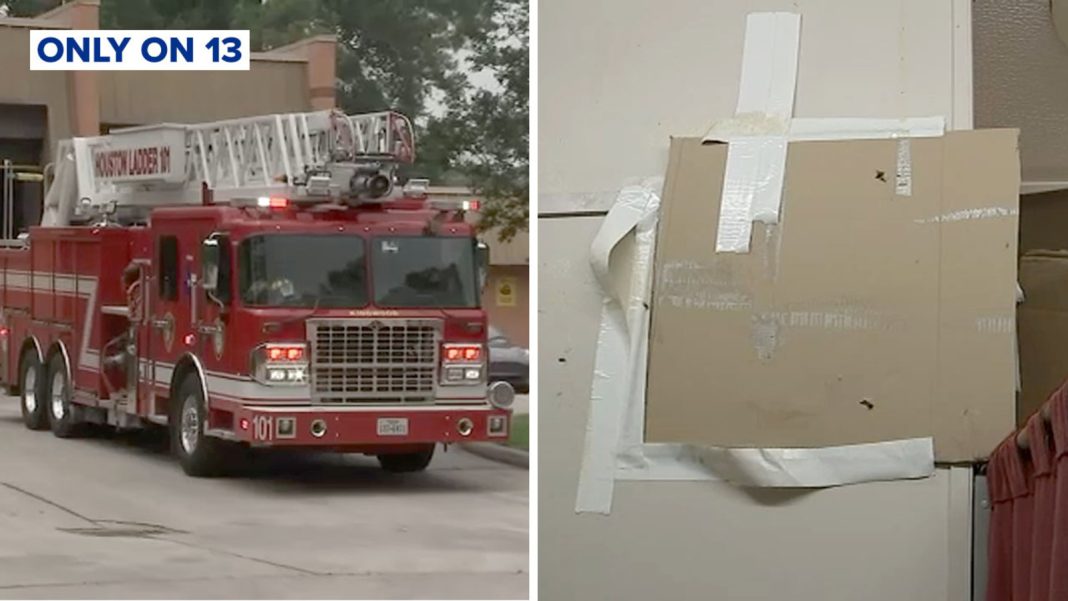In the aftermath of the devastating floods that hit Kingwood, Texas, recently, the tremendous efforts and sacrifices made by the first responders to ensure the safety and well-being of the community cannot be overstated. As Eyewitness News took a tour of where these brave individuals slept, it became evident that their living conditions were far from ideal.
At Station 101 in Kingwood, patches covered the spots where rainwater had seeped through onto old mattresses. Senior Captain Gabriel Luke from the Houston Fire Department revealed that they had to put plywood down in the dorm to prevent raccoons from entering and sleeping with the firefighters. These makeshift measures highlight the dire need for improved infrastructure and facilities for our first responders.
Moreover, the station has been grappling with other issues such as sewage problems and contaminated water. Luke mentioned that one of the residents actually provided them with water because the water at the station was undrinkable. This raises concerns about the health and well-being of the firefighters who risk their lives to protect others.
The roots of these challenges can be traced back to the annexation of Kingwood by Houston in 1996. While full-time Houston firefighters took over the station, the facilities remained largely unchanged. District Chief Christopher McAllister from the Houston Fire Department acknowledged that these stations were not originally designed for round-the-clock occupancy, which further exacerbates the problems faced by the firefighters.
The timing of ABC13’s visit to Station 101 is significant, as it sheds light on the ongoing contract dispute between Houston’s firefighters union and the city. Under former Mayor Sylvester Turner, contract negotiations failed to reach an agreement, resulting in years without raises for the firefighters and hampering recruitment and retention efforts. However, with newly elected Mayor John Whitmire, there seems to be a glimmer of hope.
Mayor Whitmire, who received an endorsement from the union during his campaign, recently announced a settlement that includes backpay and raises for firefighters. While this is undoubtedly a positive development for the brave men and women of the Houston Fire Department, the cost of the deal raises concerns about funding. Whitmire has yet to outline a plan for financing the settlement, leaving many skeptical.
The repercussions of these political battles are not limited to the firefighters themselves but also extend to taxpayers and the safety of the community. Patrick “Marty” Lancton, the president of the Houston Professional Firefighters Association, highlighted the alarming shortage of firefighters in the city. He stated that there are currently 500 fewer firefighters than in 2010, despite a significant increase in emergency calls. This shortage puts additional strain on the already burdened firefighters, compromising their ability to respond effectively to emergencies.
The dire living conditions and infrastructure issues faced by firefighters have become an unfortunate reality that they have learned to accept as part of their job. Captain Luke mentioned getting used to mold under the sink, sinks that don’t drain properly, and having to pay for repairs themselves. This acceptance should not detract from the urgency of addressing these issues and providing our first responders with the support and resources they need to carry out their crucial work.
In conclusion, the recent floods in Kingwood, Texas, have brought to light the challenges faced by our firefighters and the urgent need for improved living conditions and infrastructure. The contract dispute between the firefighters union and the city has resulted in years without raises and hindered recruitment efforts. While there is hope with a new mayor and a proposed settlement, concerns remain regarding funding and the shortage of firefighters. It is essential for elected officials to prioritize the safety and well-being of our first responders and allocate the necessary resources to ensure their success in protecting our communities.


